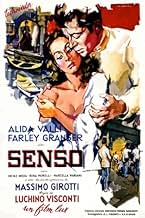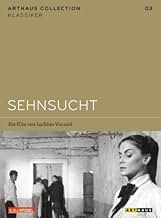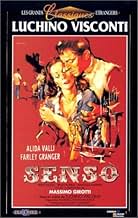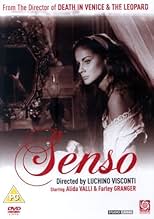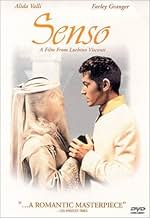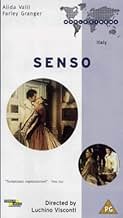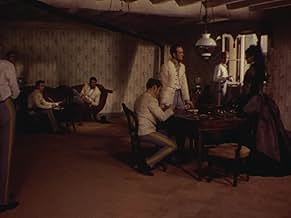VALUTAZIONE IMDb
7,4/10
9471
LA TUA VALUTAZIONE
Una contessa italiana tormentata e nevrotica tradisce la sua intera nazione per una relazione autodistruttiva con un luogotenente austriaco.Una contessa italiana tormentata e nevrotica tradisce la sua intera nazione per una relazione autodistruttiva con un luogotenente austriaco.Una contessa italiana tormentata e nevrotica tradisce la sua intera nazione per una relazione autodistruttiva con un luogotenente austriaco.
- Regia
- Sceneggiatura
- Star
- Premi
- 3 vittorie e 2 candidature totali
Franco Arcalli
- Un soldato
- (non citato nei titoli originali)
Aldo Bajocchi
- Un soldato
- (non citato nei titoli originali)
Ottone Candiani
- Un soldato
- (non citato nei titoli originali)
Nando Cicero
- Un soldato
- (non citato nei titoli originali)
Claudio Coppetti
- Un soldato
- (non citato nei titoli originali)
Cristoforo De Hartungen
- Il generale Hauptmann
- (non citato nei titoli originali)
Tony Di Mitri
- Un soldato
- (non citato nei titoli originali)
Recensioni in evidenza
Italy is still probably in ruins of war at this point, real or figurative, so what does this filmmaker do, Visconti? By waving his wand, he conjures up an earlier Italy, also in the throes of occupation and war, it's the last days of the Austrian occupation around Venice, but now it can all be placed in the safer distance of history, set up as operatic melodrama on a stage.
You'll see this self-referential waving of the hand in the just the opening scene. We open in an opera house in the middle of a play, with actors on stage valiantly rushing to weapons. As soon as the play is over, patriot viewers rain the place down with revolutionary pamphlets.
It is an operatic play that we see; film as opera. Up on this stage, collaboration with a regime can be safely contained in a love affair, rich countess falling for the dashing Austrian lieutenant. In the usual melodramatic passion, she risks all. The whole point of the story is to have moments like when news reach her of a battle won against the Austrians, but instead of rejoicing at liberation, she must look terrified because her beau might have been on that battlefield.
It's not something I can get excited about, nor would I recommend you go out of your way to find it, except as contrast to other, more pertinent things about how a viewer can be choreographed through space. I mean, here is a cinema of vistas and gestures. When a camera pans around a room that someone walks in, it's just this room that we see. War is suddenly introduced as a series of vistas with crowds rushing about, filmed in a disjointed way in order to convey chaos and mobilization and yet they manage to look placid and painterly.
But how about this? It ends with another self-referential note but now one that waves away illusion, dispels fiction. Having risked all, she finds out he's not the dashing hero of operas that she wanted him to be.
Up on this stage, turning your back on your countrymen is only the innocent fallout of passion, all because you maybe yearned for some of the romance of stories from the past.
You'll see this self-referential waving of the hand in the just the opening scene. We open in an opera house in the middle of a play, with actors on stage valiantly rushing to weapons. As soon as the play is over, patriot viewers rain the place down with revolutionary pamphlets.
It is an operatic play that we see; film as opera. Up on this stage, collaboration with a regime can be safely contained in a love affair, rich countess falling for the dashing Austrian lieutenant. In the usual melodramatic passion, she risks all. The whole point of the story is to have moments like when news reach her of a battle won against the Austrians, but instead of rejoicing at liberation, she must look terrified because her beau might have been on that battlefield.
It's not something I can get excited about, nor would I recommend you go out of your way to find it, except as contrast to other, more pertinent things about how a viewer can be choreographed through space. I mean, here is a cinema of vistas and gestures. When a camera pans around a room that someone walks in, it's just this room that we see. War is suddenly introduced as a series of vistas with crowds rushing about, filmed in a disjointed way in order to convey chaos and mobilization and yet they manage to look placid and painterly.
But how about this? It ends with another self-referential note but now one that waves away illusion, dispels fiction. Having risked all, she finds out he's not the dashing hero of operas that she wanted him to be.
Up on this stage, turning your back on your countrymen is only the innocent fallout of passion, all because you maybe yearned for some of the romance of stories from the past.
A feast for the eyes this lush melodrama may be an acquired taste for some but I doubt anyone could say it wasn't visually stunning. Venice is rendered so beautifully you will want to hop the next flight there and with the composition of all the other scenes it is like watching a story take place inside of paintings. However as gorgeous as all that is it also can be distracting and take you out of the story as you study the detail which at times feels a bit surreal. Having only seen Alida Valli in her English language films where she often seemed stiff and ill at ease her performance here is quite a revelation. She is fully in command of the screen and her anguished turmoil is compelling to watch. Farley is not bad although his part really doesn't offer him much more than being a slick and very handsome wastrel.
Senso was Visconti at his most elegant and aesthetic. It opened his series of historical spectacles. The film showed that epics and melodramas can entail political criticism as any other genres. Senso is his intelligent analysis about the Italian unification - Risorgimento. The film's criticism didn't please all the people and it suffered from censorship and it was edited several times. Nonetheless this aesthetically beautiful film still stands out as a fine ironic masterpiece.
The year is 1866 and the moment people have dreamed for decades - centuries - is in our hands. Garibaldi is coming and the Italians are beating the Austrians. In the middle of all this Visconti tells us a story about an Italian woman, who is the cousin of the leader of the underground resistance, who falls in love with an Austrian lieutenant. She is blinded by her romantic illusion and is ready to betray her family, friends, ideals and native land - these are part of the ethical problematics in Senso.
Senso was Visconti's first color film and he obviously had put a lot of effort to it. It's visually gorgeous and meant an aesthetic revolution for Italian cinema. It is no coincidence that it starts in an opera which Visconti did a lot himself too. The opening sequence shows us the basic power of Opera and melodrama - to change life, infrastructure without forgetting the concrete history.
Historical films always tell us about two different ages, intentionally or unintentionally: the one the story takes place in and the time it was made in. It's a film about the Italian unification but also a study about the deepest emotions in Italy during the 1950's. Italy after WWII, filled with neo realism - antifascist battle and hope for democracy. But also about the downside; the victory of the right-wingers and the beginning of the Cold War.
Senso is a gorgeous film which requires patience and love from its viewer. It's a political, ironic, revolutionary and aesthetic film. Truly one of the biggest landmarks in Visconti's career but also in the history of Italian cinema.
The year is 1866 and the moment people have dreamed for decades - centuries - is in our hands. Garibaldi is coming and the Italians are beating the Austrians. In the middle of all this Visconti tells us a story about an Italian woman, who is the cousin of the leader of the underground resistance, who falls in love with an Austrian lieutenant. She is blinded by her romantic illusion and is ready to betray her family, friends, ideals and native land - these are part of the ethical problematics in Senso.
Senso was Visconti's first color film and he obviously had put a lot of effort to it. It's visually gorgeous and meant an aesthetic revolution for Italian cinema. It is no coincidence that it starts in an opera which Visconti did a lot himself too. The opening sequence shows us the basic power of Opera and melodrama - to change life, infrastructure without forgetting the concrete history.
Historical films always tell us about two different ages, intentionally or unintentionally: the one the story takes place in and the time it was made in. It's a film about the Italian unification but also a study about the deepest emotions in Italy during the 1950's. Italy after WWII, filled with neo realism - antifascist battle and hope for democracy. But also about the downside; the victory of the right-wingers and the beginning of the Cold War.
Senso is a gorgeous film which requires patience and love from its viewer. It's a political, ironic, revolutionary and aesthetic film. Truly one of the biggest landmarks in Visconti's career but also in the history of Italian cinema.
Wonderful movie, and quite unexpected at the time from the neorealist Visconti, finally letting some of the operatic juice flow into his film work. It's also the first of his explorations of Italian history and social change, to be followed by The Leopard and the fantastic Rocco and His Brothers.
One caveat: At a screening a couple of years ago at MoMA, I learned that it was the Italian government that was responsible for the snipping of some crucial scenes near the end of Senso, depicting the Battle of Custozza. These were meant to make his critique of the Italian ruling classes and their failure to pull together during this period of the risorgimento more explicit. But apparently the Italian government, fresh from defeat in WW II, didn't like the idea of a major movie showing an Italian army being beaten. So the episode was truncated, leaving a few people scratching their heads about what the point of it all was. Poor Visconti tended to make long movies, and often had trouble getting them shown at the proper length in the US, but this time it was his own government that stymied him!
As for the rest: Granger is fine, but it's Valli who gives one of the all-time great move star performances. What a great face! The story is written on it, and the director wisely keeps her the focus of attention.
One caveat: At a screening a couple of years ago at MoMA, I learned that it was the Italian government that was responsible for the snipping of some crucial scenes near the end of Senso, depicting the Battle of Custozza. These were meant to make his critique of the Italian ruling classes and their failure to pull together during this period of the risorgimento more explicit. But apparently the Italian government, fresh from defeat in WW II, didn't like the idea of a major movie showing an Italian army being beaten. So the episode was truncated, leaving a few people scratching their heads about what the point of it all was. Poor Visconti tended to make long movies, and often had trouble getting them shown at the proper length in the US, but this time it was his own government that stymied him!
As for the rest: Granger is fine, but it's Valli who gives one of the all-time great move star performances. What a great face! The story is written on it, and the director wisely keeps her the focus of attention.
Italian historical melodrama, from Lux Film and director Luchino Visconti is set in Venice in 1866. The Austrian army has occupied the city-state, and will not allow it to unite with Italy. A small but increasingly vocal faction of Venetian revolutionaries are working toward rebellion, aided by the Prussians. It is with this background the main story unfolds, as Venetian countess Livia (Alida Valli), unhappily married to the much older Count (Heinz Moog), begins an affair with arrogant young Austrian officer Franz Mahler (Farley Granger). Mahler is using Livia as a diversion and for her money, but she becomes more and more obsessed with him, even as full-blown war erupts around them.
This torrid romantic melodrama is best appreciated for Visconti's painterly compositions, the excellent location cinematography, and the detailed costumes and set design. The story itself is merely adequate, and the performances are uneven. Valli has some great moments, but in others she's asked to play it too wild-eyed and big. Granger is sneering and self-satisfied, but he loses it a bit in his big breakdown scene near the end. Visconti edited an English-language version which was re-titled The Wanton Countess and ran 30 minutes shorter. That version's English dialogue was written by Tennessee Williams and Paul Bowles. Among Visconti's assistants on this film were future directors Francesco Rosi and Franco Zeffirelli. This is one of the 1001 Movies You Must See Before You Die.
This torrid romantic melodrama is best appreciated for Visconti's painterly compositions, the excellent location cinematography, and the detailed costumes and set design. The story itself is merely adequate, and the performances are uneven. Valli has some great moments, but in others she's asked to play it too wild-eyed and big. Granger is sneering and self-satisfied, but he loses it a bit in his big breakdown scene near the end. Visconti edited an English-language version which was re-titled The Wanton Countess and ran 30 minutes shorter. That version's English dialogue was written by Tennessee Williams and Paul Bowles. Among Visconti's assistants on this film were future directors Francesco Rosi and Franco Zeffirelli. This is one of the 1001 Movies You Must See Before You Die.
Lo sapevi?
- QuizThe film opens in La Fenice, the Venice opera house. La Fenice was destroyed by arson in 1996, but reopened in 2003. Enlarged frames of this movie were used as a reference in reconstructing it.
- Citazioni
Il tenente Franz Mahler: It's too late! It's over! I'm not your romantic hero!
- Versioni alternativeTwo versions of the film are available on video.
- One version is missing the scene where Livia tries to explain where all the money meant for the troops went.
- Another version is missing the climatic battle sequence between the Austrian and Italian troops.
- ConnessioniEdited into Histoire(s) du cinéma: La monnaie de l'absolu (1999)
- Colonne sonoreSinfonia N. 7 in mi maggiore (7th Symphony)
Music by Anton Bruckner
Performed by Orchestra Sinfonica Nazionale della Rai
Conducted by Franco Ferrara
I più visti
Accedi per valutare e creare un elenco di titoli salvati per ottenere consigli personalizzati
- How long is Senso?Powered by Alexa
Dettagli
- Data di uscita
- Paese di origine
- Lingue
- Celebre anche come
- The Wanton Contessa
- Luoghi delle riprese
- Teatro La Fenice, Venezia, Italia(opening scenes)
- Azienda produttrice
- Vedi altri crediti dell’azienda su IMDbPro
Botteghino
- Budget
- ITL 700.000.000 (previsto)
- Lordo Stati Uniti e Canada
- 27.723 USD
- Fine settimana di apertura Stati Uniti e Canada
- 3984 USD
- 28 ott 2018
- Lordo in tutto il mondo
- 27.723 USD
- Tempo di esecuzione
- 1h 58min(118 min)
- Colore
Contribuisci a questa pagina
Suggerisci una modifica o aggiungi i contenuti mancanti

![Guarda Trailer originale italiano [OV]](https://m.media-amazon.com/images/M/MV5BYzc0Y2MyOGMtMzg0My00Mzc4LWIwYjItZjg1ZDhmMDZmOTlkXkEyXkFqcGdeQXRodW1ibmFpbC1pbml0aWFsaXplcg@@._V1_QL75_UX500_CR0)

